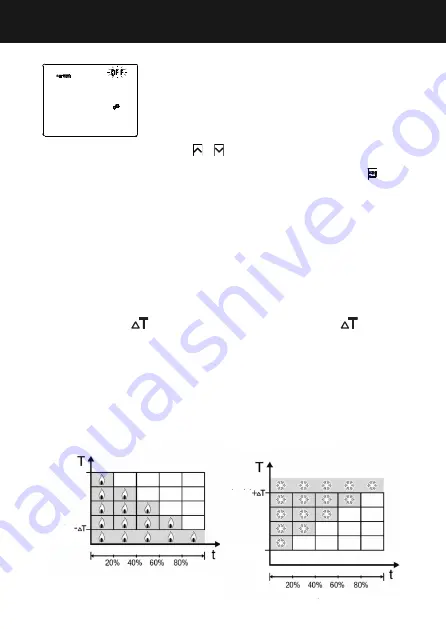
26
PWM PROPORTIONAL-INTEGRAL
The PWM control algorithm, used to control the temperature adjustment system, allows
you to drastically reduce the times subject to thermal inertia and introduced by the two-
point control. This type of control involves the modulation of the impulse duty-cycle,
represented by the temperature adjustment system activation time, on the basis of the
difference between the fixed setpoint and the temperature effectively detected. Two
components are needed to calculate the output function: the proportional component
and the integral component, used to improve the response in order to reach the
temperature at the fixed setpoint. Once the proportional band has been defined (from
setpoint to setpoint -
for heating mode, from setpoint to se
for cooling
mode), its width determines the extent of the system response: if it is too narrow, the
system will be more reactive but with swings; if it is too wide, the system will be slower.
The ideal situation is one where the band is as narrow as possible, without swings. The
integration time is the parameter that determines the action of the integral component.
The longer the integration time, the slower the modification of the output and hence the
slower the system response. If the time is too short, the threshold value will be exceeded,
and the function will swing around the setpoint.
Activating the self-learning function (heating mode only)
The self-learning function allows you to optimise the heating
activation advance (max. 2 hours). The timed thermostat
manages the advance automatically so as to guarantee the set
temperature at the start of each programmed profile period.
This function can only be activated in heating mode, in
automatic operation.
Use the
or
button key to activate (ON) or deactivate (OFF)
the temperature degree self-learning function. To confirm your
choice and move on to the next parameter, press the
button
key within 30 seconds.
USER INSTRUCTIONS
cycle time
cycle time
set-point
set-point
A
IR
-
CONDITIONING
H
EATING
set-point
set-point
Summary of Contents for Chorus GW 10 794H
Page 2: ......















































